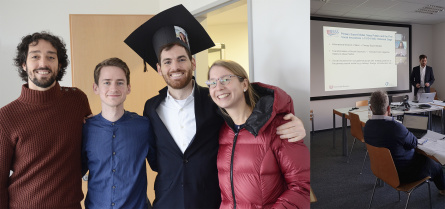
Martín Cortina Escudero has successfully defended his PhD thesis on Wednesday, November 23rd, 2023. Martín was member of the CRC 1342 in the 1st funding period, working in the project International Complementarities in the Development of the Welfare State. The Transatlantic Sphere (1870–2020), directed by Philip Manow and Sarah Berens.
For his PhD monograph "“Diverging Paths of Social Policy Development in Latin America States: A Case Study on Argentina and Mexico from the Colonial Times to the Early Post-World-War-II Period", Martín has investigated the international factors contributing to the two countries’ diverging paths in social policy in the period from colonialism until the 1960s.
Martín started out with his research question "Why did similar paths lead to different social policy outcomes in Argentina and Mexico?" In his literature review he could not find decent explanations for the variations among the social policy developments in Latin American countries. Therefore Martín chose the examples of Argentina and Mexico to test his hypothesis that colonial legacies were a key factor. He examined historical documents, parliamentary debates and secondary resources to test his hypothesis, applying a mixed-methods approach, combining process tracing, Qualitative Comparative Analysis and descriptive statistics.
Martín found that Mexico and Argentina went through similar historical stages – the transition to modern capitalism (1810-1910), the adoption of a primary export model (1910-1940) and an industrialization process focussing on import substitution import (1940-1960). These stages to some degree led to some convergence in countries’ social policy developments.
The colonial legacies of both countries on the other hand prepared the ground for the differences in their social policy arrangements: Mexico with its abundance in precious metals and its large indigenous population was very much in the focus of the Spanish Empire, which therefore implemented strong colonial structures in Mexico. In Argentina the opposite had happened, because it was resource scarce and not densely populated – as a result the Spanish Empire did not spend as much money and effort on implementing hierarchic colonial structures. These disparities paved the way for Argentina to eventually develop a political regime of electoral competition in the first half of the 20th century, whereas Mexico developed an authoritarian regime.
These differences in regime types, amplified by the differences in the working classes’/unions’ influence on political decision-making processes, has shaped the social policy decisions of both, Mexico and Argentina, Martín has found. Argentina’s social policy was rather extensive and stratified up, whereas Mexico’s social policy was rather limited and unified, privileging civil servants.
After his presentation Martín received valuable feedback and criticism on his work from the committee that he will be taking into account before submitting to an academic publisher.













